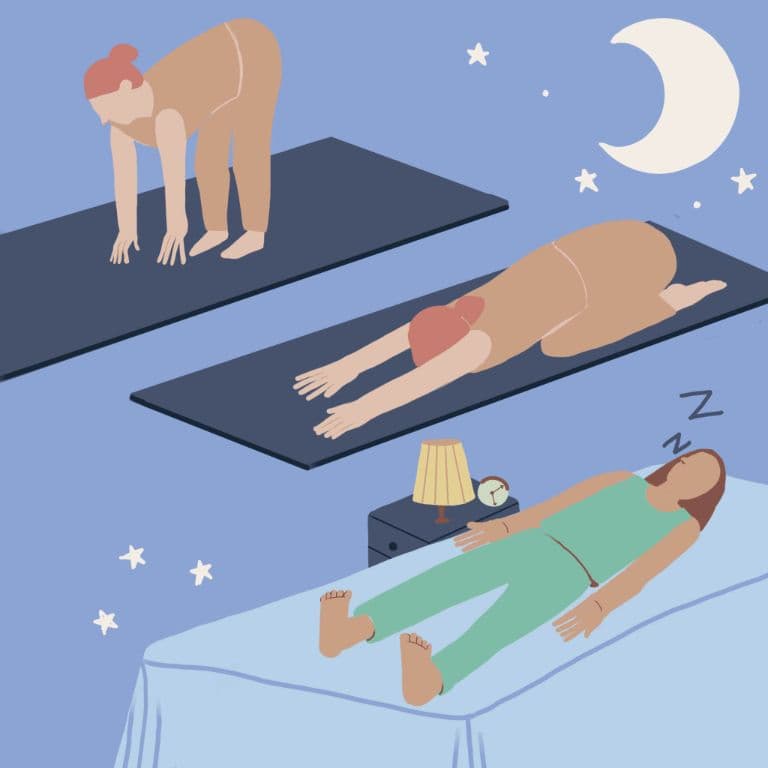When the body engages in sleeping, the bodily functions wind down and you are meant to relax. While for some, the wind-down process is very easy and quick, but for some people, it can take longer and they face difficulties falling asleep, further causing insomnia. Practising yoga before bedtime can be a very useful habit to relax and release whatever your mind and body are holding onto. This will allow you to completely relax and sink into a peaceful night of deep and restorative sleep. Once you incorporate relaxing yoga practices into your nighttime routine, you will observe that the quality and duration of your sleep have improved. This is highly beneficial for those who are light sleepers, suffering from insomnia or have limited time for sleep. The American Academy of Sleep Medicine has defined Insomnia as “persistent difficulty with sleep initiation, duration, consolidation or quality”.
But what are the causes for such poor sleep quality?
- An unhealthy lifestyle and sleep habits can cause insomnia. Your diet directly affects your body and an unhealthy body is at a higher risk of insomnia.
- Depression is one of the root causes of insomnia. For those suffering from constant stress, anxiety and clinical depression, falling asleep and getting good sleep are very difficult due to their natural conditions.
- Other health conditions like pregnancy, bladder control issues, enlarged prostate, which require frequent trips to the bathroom can keep one awake through the night.
- Insomnia is also closely associated with chronic pain conditions, restless leg syndrome, heart, and lung diseases.
- Excessive consumption of alcohol, nicotine, and other drugs, as well as caffeine, are only known to make insomnia worse.
Sleep quality v/s sleep quantity
Different individuals have different definitions for sound sleep. For some, sleeping for longer hours is what keeps them energized for the next day. And for some, the duration doesn’t matter but what matters is that they have an undisturbed and peaceful sleep. It is observed that increased amounts of sleep do not necessarily correlate with quality sleep and overall well-being.
How does yoga help in improving sleeping habits and giving a good night's sleep?
Yoga provides numerous health and sleep benefits to children as well as adults. Research has proven that women often experience more difficulty while sleeping than men, and this could be due to cultural as well physiological trends. And practicing yoga regularly can help women achieve this balance. Yoga has the potential to control sleep issues during pregnancy, pre, and post-natal anxiety, and even sleep disturbances around menopause.
Some positive impacts that yoga can have on your sleeping routine
- Yoga has been tremendously useful in weight management and weight loss programs. It also helps in controlling eating habits and thus makes you more mindful.
- Trying calm yoga poses will lower your state of excitement and help you to relax. It also helps in maintaining blood pressure levels and reduces the stress hormone cortisol – further improving your sleep routine.
- Yoga also regulates your circadian rhythms, hormonal imbalances, aids in digestion, removes constipation, and overall maintains homeostasis or balanced functions and systems of the body. This will eventually make you feel good and healthy from within and relax your body, thus giving you a fulfilling sleep.
Yoga techniques and asanas you can try during bedtime
- Yoga Nidra – This is also called yogic sleep. It is a very powerful meditation technique. In this meditation, you are lying down and freeing up your body while letting your inner voice and consciousness speak, while the rest of your body relaxes. This can never be done incorrectly, as all you have to do is lie down and focus only on your breathing, sensations, and thoughts.
- Deep breathing – When you begin taking deep breaths, your heart rate slows down and your body is in a very relaxed state. Hence, doing deep and focused breathing right before you sleep, can improve your sleep quality.
- Meditation – A guided meditation with a combination of nature’s peaceful sound therapy or following verbal cues of an expert can calm your mind and body while helping you wind down.
- Pranayama – In yoga, there are different types of pranayama for you to begin with. Pranayama is a basic breath control exercise that is very beneficial for the lungs. With a combination of inhaling, exhaling, and holding your breath, you can practise abdominal breathing, & alternate breathing.
- Ardha Uttanasana – In this asana, you should stand half-forward bent, with your fingers touching the floor. You can also try this using a wall. This pose helps stimulate abdominal organs and works as a full-body stretching exercise. This stretching can loosen up your body and relax it.
- Balasana or Happy Child’s Pose – This asana is considered to be a stress-relieving pose. You have to sit in a Vajrayana position and stretch out your hands straight, touching the floor and head bent over the belly to touch the knees. Just like a happy child while waking up from a sound sleep.
- Supta Baddha Konasana or Reclining Bound Angle – For practising this asana, lie on your back. Then press the soles of your feet together and open your knees to the sides. And your hands can be at your sides or above your head.
- Shavasana or Corpse Pose – Simply lie down on your back and pretend to be a lifeless body. Keep your hands and legs open and wide apart while letting your body relax and just be.

Along with yoga, you can also follow some of the below practices that induce good sleep
- Finish your dinner at least 2-3 hours before you sleep.
- After sunsets (7 PM), avoid eating tamasic food which includes fried & spicy food, tea, caffeine, beans, rajma, high-fat fishes and meat, etc.
- Make sure the postures are calming, restorative, and inward-focused
- Sleep in a healthy, clean healthy clean environment and maintain a comfortable room temperature. Log off all electronics 30 minutes before bed and have minimal lighting while sleeping.
- Set and follow a nighttime routine, like brushing your teeth, changing to fresh and clean comfortable nightwear, reading, and relaxation routine with yoga Nidra or meditation.
- Avoid getting into arguments/ fights with friends and family late at night. It will prevent your mental state from being hampered as well as give you time to think things through.
- Be easy on yourself if you slip from your routine. You can always start over.
- Maintain a healthy diet and exercise regularly during the day.
- Use your bedroom only for sleep and intimate sex – avoid working, playing video games, and other stimulating activities.
- Keep yourself hydrated and stay motivated.
- Long-term yoga practitioners have effectively been able to control and eradicate all their sleep-related issues.
While we hope that practising yoga can help you attain better sleep, we would want you to remember that yoga is not a substitute for medical treatment. If you are facing persistent difficulties with your sleeping routine, you must consult your doctor and get yourself diagnosed and treated.
Disclaimer - This information is educational and should not be construed as medical advice. Please consult your doctor before making any dietary changes or adding supplements.
Proactive For Her is a digital clinic for women, offering accessible, personalised, and confidential healthcare solutions. We offer out-patient care, diagnostic services and programs for various health concerns of Indian women, across their lifetime - from puberty to pregnancy to menopause.

